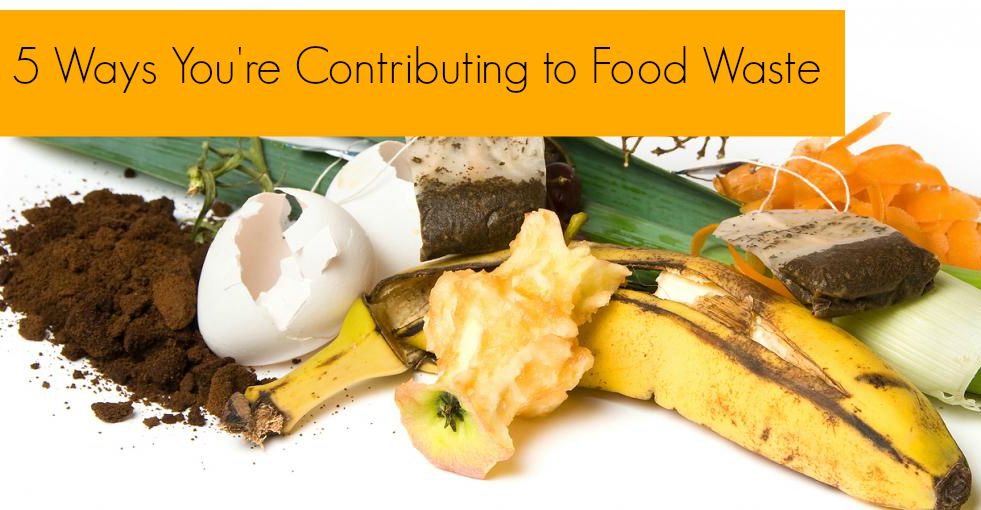All week, we’ve been talking about food waste: the raw numbers, where food waste is happening, and what to do about it. We all contribute to food waste – whether consciously or unconsciously – and it’s a problem that we can each tackle in our little corner of the universe. From making smarter purchasing decisions at the grocery store to forming a better understanding of food “sell by” dates. But one thing you may not realize is exactly how you’re contributing to food waste. Here are five common ways you’re most likely contributing to food waste.
1. Throwing Out Small Amounts of Lunch and Dinner Leftovers
When most people think of leftovers, they think of enough food to be an additional meal or two. What people generally don’t think of is storing and saving small portions (like a side of roasted potatoes or black beans) for inclusion in tomorrow’s lunch or dinner as an ingredient. For instance, a side of black beans for dinner one night could be added to a serving of rice the next day for a quick tasty lunch. And even though throwing away small amounts of food may not seem like a lot, it can quickly add up to hundreds of pounds of food each year.
2. Picking Produce Based Solely on Appearance
One of the bigger contributors to food waste is something that might seem a bit surprising: appearance. When it comes to produce, we all want our fruits and veggies to look perfect. That means, oranges that are perfectly round; tomatoes that lack any bruises or soft spots, and bananas that are perfectly bright yellow. The problem is fresh produce doesn’t always look like that. If you’ve ever spent time on a farm, you know that real produce is sometimes ugly. Produce skin might be splotchy, vegetables might be misshapen, and fruits might have some discoloration. That doesn’t mean that they taste any different than prettier produce. But it does mean that there’s a much higher chance that they won’t be sold. And if they don’t get sold at the grocery store before they go bad, they’re going to get thrown out. And unfortunately, most produce that gets thrown out of grocery stores ends up in landfills.
3. Throwing Out Food on its “Sell-By” Date
Do you know the difference between an expiration date and a sell-by date? If you’re like most people, there’s probably some confusion around which one means that food is no longer safe to eat, and which one has no relation to food safety at all. “Sell-by” dates are used by food manufacturers as a way to let consumers know when the food they’re eating is at its freshest. The problem is that sell-by dates and expiration dates are often mixed up by consumers, who throw out food once it’s passed its sell-by date, which results in a LOT of otherwise perfectly good and edible food gets thrown in the trash.
4. Grocery Shopping Too Infrequently
Unless you’re a chef like me, and really enjoy browsing the local supermarket or farmer’s market for new produce, you probably don’t want to head to the grocery store a few times a week. However, shopping for food more frequently allows you to take advantage of daily deals, constantly cook fresh cuts of meat, and (according to many studies) cuts down significantly on food waste because you aren’t over-buying. Purchasing too much food at the market is a common issue for most families. Whether you’re just overestimating how much food your family will realistically consumer over a week or two week period, or you’re making too many impulse purchases at the supermarket, shopping for food infrequently has been shown to lead to a good bit of food waste. To counter that, try picking up food for the following 2-3 days, and then heading back to the grocery store when you run out of perishables.
5. Purchasing Pre-made Meals From Your Local Grocer
Purchasing pre-made meals might seem like a no-brainer. It’s healthy and requires minimal work. The problem is that these meals have to be made in bulk for a supermarket, and ones that don’t end up selling usually end up getting tossed. When you’re talking about a small roasted chicken or a batch of egg salad, it’s generally enough food to feed a family of four.
While it might seem like a bit of a stretch to say that purchasing pre-made grocery deli meals leads to food waste, it really isn’t. Purchasing leads to demand, and demand leads to increased production of pre-made meals, which often leads to some amount of overproduction. And overproduction leads to waste.






Trackbacks/Pingbacks